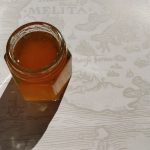Honey in the Ancient World
One of the earliest recipes featuring honey appears in the Deipnosophitae, an epic fifteen-volume recount of conversations that take place in the course of a fictitious banquet. The author of this opus is the Greek scholar Athenaeus, a native of the Egyptian trading port of Naucratis, who was writing in around AD 200. In it he attributes a recipe for honeyed cheesecakes to Epicharmus, a dramatist and a philosopher which dates back to around 500Bc. Wheaten flour is wetted, and then put into a frying pan; after that honey is sprinkled over it, and sesame and cheese.
In his tome, Athenaeus quotes another recipe. Chrysippus, who is ‘a clever writer on confectionery’ serves up a dessert that involves pounding roasted nuts and the seedhead of a poppy in a mortar and adding it to a mixture of boiled honey and fruit juice, cutting into squares and sprinkling them with sesame seeds. The ancient Greeks mass-produced honey which they then traded. In a record of 1300 BC, an ass or ox has the equivalent value of 110 pots of honey.
In his Verrines, the great Roman orator Cicero accuses Verres, a corrupt Roman praetor who governed Sicily and Malta between 73 and 71 BC, of pilfering a great many objects including 400 jars of honey ‘for which the Maltese Islands have always been renowned.’
Honey will be the subject of a cookalong webinar being held on May 27th, 2021, at 7 pm. For more information and to register, click the following link – https://zoom.us/webinar/register/WN_U_jBwCdASBCZTlIPmf9cSA





